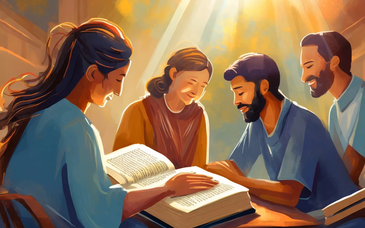Elijah: Lessons From His Life
1) We are never closer to defeat than in our moments of greatest victory
2) We are never as alone as we may feel; God is always there
3) God speaks more frequently in persistent whispers than in shouts (I Kings 19:11-18)
Elijah experienced the depths of fatigue and discouragement just after his two great spiritual victories: the defeat of the prophets of Baal and the answered prayer for rain. Often discouragement sets in after great spiritual experiences, especially those requiring physical effort or producing emotional excitement. To lead him out of depression, God first let Elijah rest and eat. Then God confronted him with the need to return to his mission in life--to be God's prophet. Elijah's battles were not yet over; there was still work for him to do. When you feel let down after a great spiritual experience, remember that God's purpose for your life is not yet over.
False Prophets vs. True Prophets
1. Worked for political purposes to benefit themselves vs.
Worked for spiritual purposes to serve God and the people
2. Held positions of great wealth vs.
Owned little or nothing
3. Gave false messages vs.
Gave only true messages
4. Spoke only what the people wanted to hear vs.
Spoke only what God told them to say - no matter how unpopular
The false prophets were an obstacle to bringing God's Word to the people. They would bring messages that contradicted the words of the true prophets. They gave "messages" that appealed to the people's sinful natures and comforted their fears. False prophets told people what they wanted to hear, not what they really needed to hear. True prophets told God's truth.
King Ahab's Life
The kings of Israel, both good and evil, had prophets sent by God to advise, confront, and aid them. King David had a faithful friend in God's prophet Nathan; Ahab could have had an equally faithful friend in Elijah. But while David listened to Nathan, and was willing to repent of his sins, Ahab saw Elijah as his enemy. Why? Elijah always brought difficult news to Ahab. Unfortunately, Ahab refused to acknowledge that it was his constant disobedience to God and persistent idol worship that brought evil on his nation. He blamed Elijah for bringing the prophecies of judgment, rather than taking his advice as a prophet of God.
Ahab was trapped by his own choices and he was unwilling to take the right action. As king, he was responsible to God and his prophet Elijah, but he was married to an evil woman who drew him into idol worship. He was a childish man who brooded for days if unable to get his own way. He took his evil wife's advice, listened only to the "prophets" who gave good news, and surrounded himself with people who encouraged him to do whatever he wanted. The value of advice cannot be judged by the number of people for or against it. Ahab consistently chose to follow the majority opinion of those who surrounded him, and that led to his death.
It may seem nice to have someone encourage us to do whatever we want, because advice that goes against our wishes is difficult to accept. However, our decisions must be based on the quality of the advice, not the majority opinion of our peers. God encourages us to get advice from wise counselors, but how can we test the advice we receive? Advice that agrees with the principles in God's Word is reliable. We must always separate advice from our own desires, the majority opinion, or whatever seems "best" in our limited perspective, and weigh it against God's commands. He will never lead us to do what He has forbidden in His Word--even in principle. Unlike Ahab, we should trust Godly counselors and have the courage to stand against those who would have us do otherwise.
The choice of a mate will have a significant effect on your life: physically, spiritually, and emotionally.

